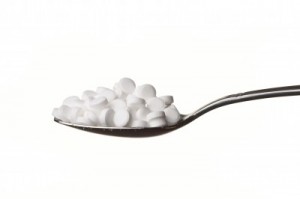By Sayer Ji
Contributing Writer for Wake Up World
A new study published this month (Nov. 2012) in the journal Appetite revealed that when rats* were given the synthetic sweeteners saccharin and aspartame, compared to sucrose (table sugar), they gained more weight even at similar total caloric intake levels.[i]
The researchers set out to experimentally confirm the suggestion that the use of non-nutritive sweeteners can lead to weight gain, noting that “evidence regarding their real effect on body weight and satiety is still inconclusive.”
In the study design, twenty-nine male rats received plain yogurt sweetened with 20% sucrose, 0.3% sodium saccharin or 0.4% aspartame, in addition to chow and water without restriction. After measuring their cumulative body weight gain, total caloric intake, caloric intake of chow and caloric intake of sweetened yogurt weekly for 12 weeks, they concluded “greater weight gain was promoted by the use of saccharin or aspartame, compared with sucrose, and this weight gain was unrelated to caloric intake. We speculate that a decrease in energy expenditure or increase in fluid retention might be involved.”
Discussion
Satiety, that is, the ability to satisfy the appetite, should be a function of how nourishing something is. Artificial sweeteners, which divorce sweetness from caloric content (i.e. nourishment), leave the cells without the monosaccharides — primarily glucose — they need and crave, and which is why the sensation of sweetness is hard-wired in our bodies to illicit a feeling of pleasure. Ultimately, nonnutritive synthetic sweeteners could be considered neuroendocrine disruptors, breaking, altering or amplifying the intimately connected feedback loops between pleasure and nourishment, deprivation and fat-storage, exertion and inactivity, some of which are as ancient as life itself.
The fact that the rats in both the artificial sweetener and sugar groups consumed the same amount of calories, highlights how chemicals (aspartame and saccharin), much like pesticides, may actually poison us into gaining weight. [ii] [iii] [iv]
The challenge for millions of consumers around the world is clearly recognizing the dangers of artificial sweeteners like aspartame, given it is safety approved in 90 nations. Despite reassurances from many world governments, manufacturers and marketers, the research itself does not lend unequivocal support to the view that they are entirely safe.
For those interested in viewing the ‘other side’ of the evidence, you will find peer-reviewed and published research on GreenMedInfo.com linking aspartame to over 40 adverse health effects, including fibromyalgia, brain cancer, kidney damage, urinary tract cancer, leukemia and many other serious conditions.[v] Saccharin has also been linked to urinary tract cancer, DNA damage, aging, atherosclerosis, and hyperinsulinism.[vi]
For healthy alternatives to synthetic sweeteners and sugar, read: Sweet! Dieting Without the Deprivation.
*While GrenMedInfo.com & WakeUpWord.com cites and indexes research performed on animals we do not believe animal experimentation is necessary. For more information read our dedication page.
Article Sources
[i] Fernanda de Matos Feijà³, Càntia Reis Ballard, Kelly Carraro Foletto, Bruna Aparecida Melo Batista, Alice Magagnin Neves, Maria Flà¡via Marques Ribeiro, Marcello Casaccia Bertoluci. Saccharin and aspartame, compared with sucrose, induce greater weight gain in adult Wistar rats, at similar total caloric intake levels. Appetite. 2012 Oct 19. Epub 2012 Oct 19. PMID: 23088901
[ii] Claudia Twum, Yudan Wei. The association between urinary concentrations of dichlorophenol pesticides and obesity in children. Rev Environ Health. 2011 ;26(3):215-9. PMID: 22206198
[iii] Monika Rönn, Lars Lind, Bert van Bavel, Samira Salihovic, Karl Michaà«lsson, P Monica Lind. Circulating levels of persistent organic pollutants associate in divergent ways to fat mass measured by DXA in humans. Chemosphere. 2011 Jul 16. Epub 2011 Jul 16. PMID: 21767864
[iv] Duk-Hee Lee, Michael W Steffes, Andreas Sjödin, Richard S Jones, Larry L Needham, David R Jacobs. Low dose organochlorine pesticides and polychlorinated biphenyls predict obesity, dyslipidemia, and insulin resistance among people free of diabetes. PLoS One. 2011;6(1):e15977. Epub 2011 Jan 26. PMID: 21298090
[v] GreenMedInfo.com, Adverse Health Effects of Aspartame
[vi] GreenMedInfo.com, Adverse Health Effects of Saccharin
About the author:

Sayer Ji is the founder of Greenmedinfo.com, a reviewer at the International Journal of Human Nutrition and Functional Medicine, Co-founder and CEO of Systome Biomed, Vice Chairman of the Board of the National Health Federation, and Steering Committee Member of the Global Non-GMO Foundation.
For more, visit GreenMedInfo.com and Facebook.com/GreenMedInfo, or sign up for GreenMedInfo’s free e-Newsletter.
Recommended articles by Sayer Ji:
- Brain Regeneration: Why It’s Real and How To Do It
- Research: Garlic is an Effective Natural Treatment for Heart Disease
- Wi-Fi Devices Increase Mercury Release From Dental Amalgams
- Mammography Is Harmful and Should Be Abandoned, Scientific Review Concludes
- “Killer Germs” Obliterated by Medicinal Smoke Smudging, Study Reveals
- Turmeric’s ‘Smart Kill’ Properties Put Chemo & Radiation To Shame
- Beet Juice Boosts Cognitive Function In One Dose
- The Powerful Aspirin Alternative Your Doctor Never Told You About
- 13 Evidence-Based Medicinal Properties of Coconut Oil
- Group Drumming Better Than Prozac, Study Suggests
- 25 Cancer Stem-Cell Killing Foods That Are Smarter Than Chemo and Radiation
- Ibuprofen Can Stop Your Heart – 31% Increase in Cardiac Arrest Risk
© GreenMedInfo LLC. This work is reproduced and distributed with the permission of GreenMedInfo LLC. Want to learn more from GreenMedInfo? Sign up for their newsletter here.

If you've ever found value in our articles, we'd greatly appreciate your support by purchasing Mindful Meditation Techniques for Kids - A Practical Guide for Adults to Empower Kids with the Gift of Inner Peace and Resilience for Life.
In the spirit of mindfulness, we encourage you to choose the paperback version. Delve into its pages away from screen glare and notifications, allowing yourself to fully immerse in the transformative practices within. The physical book enriches the learning process and serves as a tangible commitment to mindfulness, easily shared among family and friends.
Over the past few years, Wake Up World has faced significant online censorship, impacting our financial ability to stay online. Instead of soliciting donations, we're exploring win-win solutions with our readers to remain financially viable. Moving into book publishing, we hope to secure ongoing funds to continue our mission. With over 8,500 articles published in the past 13 years, we are committed to keeping our content free and accessible to everyone, without resorting to a paywall.







